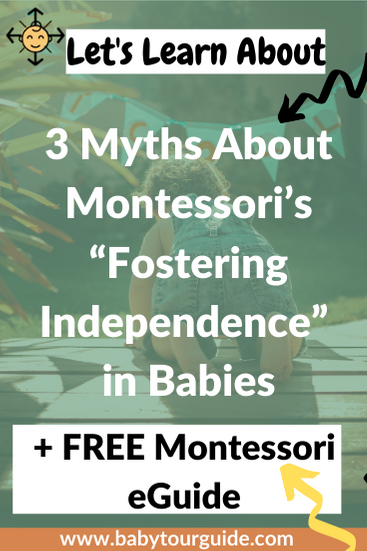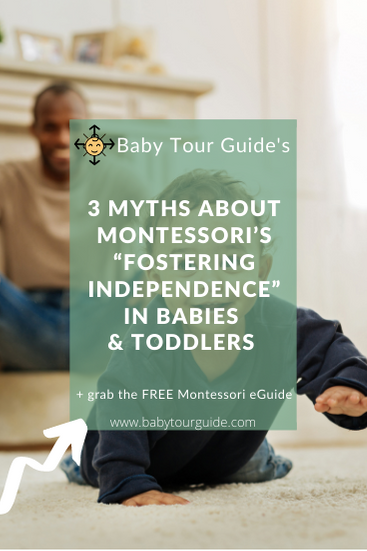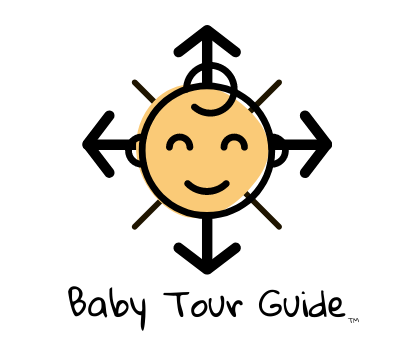There is so much amazing info but also controversy around fostering independence in babies and toddlers, and since it is one of the foundational Montessori concepts, I thought I would dive into the ins and outs of fostering independence. You know…. get that conversation started!
Various approaches with children and child rearing in general will come with its opinions and ideas. And I’m a huge proponent for informed decision making. My goal is to always empower your Montessori practice by offering information so you can make the most informed decisions as possible for yourself, your sweet baby, and your family.

Fostering independence in babies and toddlers as a term in general requires further explanation. Because babies and toddlers are dependent, right?
Right! They totally are. Which leads me to myth #1…
Myth #1: Fostering Independence means teaching your babies to no longer need you.
This is actually a myth that I bust quite frequently in my line of work. Fostering independence does not mean making your tiny baby fend for themselves by any means! Or that that’s the goal within fostering independence in infancy and toddlerhood.
Rather what fostering independence does mean is that you’re including your baby in their daily processes as much as possible. We know that babies need the consistency of their parents and caregivers to form their trust in the world by developing a healthy attachment.
So we meet those needs! We feed them, nap them, change them, and love them to pieces. The fostering independence piece meant a that we are involving and teaching them in these processes.
Which leads me to myth #2…
Myth #2: Meeting Babies and Toddlers Needs Means Always Doing Everything For Them
This is a deeply rooted myth, because up until recent times, babies were believed to be helpless little beings. The idea was to meet their basic needs and get through that stage to then begin their education later when they “understand” or in young childhood. But in the last 50 years or so, through research and observation, the child development and family sciences fields began to really notice the importance of the first few years of life. And how we can lay amazing developmental foundations through our everyday interractions!
And all that said, our instincts to do everything for our babies typically comes from deeply rooted ideas engrained within our familial child rearing approaches and cultural child rearing approaches all passed down from generation to generation.
But what if we take Montessori’s fostering independence idea into consideration and begin to involve our babies as much as possible? Perhaps meeting their needs can also include them and teach them within the process! And If we are giving our babies opportunities to learn, why not try whenever possible? 😉
Which leads me to Myth #3

Myth #3: Fostering Independence leads to Unhealthy Attachments
On the contrary, it leads to peaceful parenting and an empowered early understanding of their world! Let me explain…
Essentially, when we incorporate the idea of fostering independence in babies and toddlers, we are giving them the gift of tiny learning opportunities throughout their day by following the child’s needs and interests.
As their parents or caregivers, we are always there meeting their needs, but involving them in the process and letting them try for themselves as often as developmentally appropriate can make a huge impact on their development. Within this, we’re talking to them, observing their interests, and honoring the uniqueness of each child!
For example, in a 5 month old baby this may look like letting them hold their own bottle if they bottle feed and they’re reaching for it. This may look like offering two grasping materials when your child is on their back and seeing which they reach for.
In a 10 month old baby, this may look like letting them self-feed with utensils during solid feedings as they’re reaching for the spoon. Perhaps we teach them to drink from an open cup during feedings. Perhaps we teach our young crawlers, cruisers, and walkers how to safely go down stairs backwards if they speed crawl or walk toward the stairs whenever the baby gate is open.
In a 12 month old baby, maybe this looks like allowing an extra 15 minutes within your morning routine before you leave the house to allow for your child to practice putting on and taking off their shoes. In an 18 month old baby, maybe this looks like getting them involved in the preparation of their snacks and meals!
Fostering independence in babies and toddlers means that we consistently meet the needs of our infants while offering opportunities for inclusion in the process. These tiny learning opportunities may take a couple extra minutes in your day to day experiences. But let me tell you… in my experience I can tell you that these extra efforts and moments have been fully worth it.
It’s a joy in childhood that we know to exist, but it is so amazing if we offer these opportunities from infancy, just as they are learning about themselves and their world.
